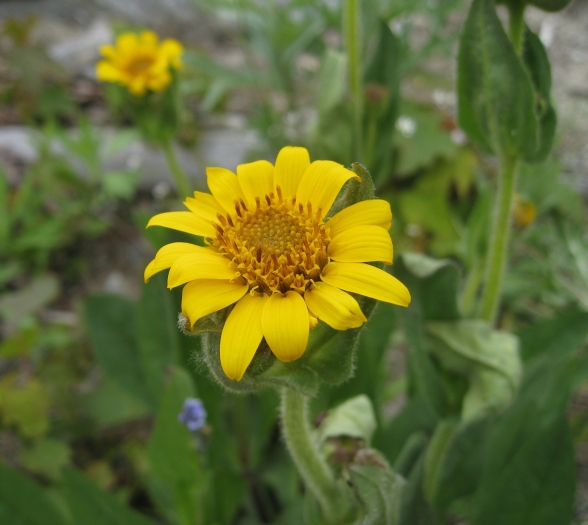Longleaf Arnica
(Arnica longifolia)
Longleaf Arnica (Arnica longifolia)
/
/

J Brew
CC BY-SA 4.0
Image By:
J Brew
Recorded By:
Copyright:
CC BY-SA 4.0
Copyright Notice:
Photo by: J Brew | License Type: CC BY-SA 4.0 | License URL: http://creativecommons.org/licenses/by-sa/4.0/ | Rights Holder: J Brew | Publisher: iNaturalist | Date Created: 2011-07-03T15:17:47-07:00 |
























Estimated Native Range
Summary
Arnica longifolia, commonly known as Longleaf Arnica, is a rhizomatous perennial herb that thrives in the understory of montane and subalpine coniferous forests, as well as in meadows and streambanks in western Canada and the western United States. It typically grows to a height of 1 to 2 feet (30-60 cm) and spreads to form dense clumps or groundcover. Longleaf Arnica is characterized by its lanceolate leaves that can reach up to 8 inches (20 cm) in length and its bright yellow ray florets surrounding reddish disc florets that bloom from late spring to early summer. The flowers are moderately showy and attract a variety of pollinators.
In cultivation, Longleaf Arnica is valued for its medicinal properties, as Arnica has been traditionally used to reduce swelling and bruising. It is also appreciated for its bright yellow flowers that can enliven woodland gardens, naturalized areas, or borders. This plant prefers cool, moist conditions, and well-drained, acidic to neutral soil. It requires partial to full shade, making it suitable for shaded garden spots where other flowers might struggle. While generally low-maintenance, it can be susceptible to root rot if overwatered or planted in poorly drained soils. Longleaf Arnica is not commonly available in the nursery trade but can be propagated by division or from seed.CC BY-SA 4.0
In cultivation, Longleaf Arnica is valued for its medicinal properties, as Arnica has been traditionally used to reduce swelling and bruising. It is also appreciated for its bright yellow flowers that can enliven woodland gardens, naturalized areas, or borders. This plant prefers cool, moist conditions, and well-drained, acidic to neutral soil. It requires partial to full shade, making it suitable for shaded garden spots where other flowers might struggle. While generally low-maintenance, it can be susceptible to root rot if overwatered or planted in poorly drained soils. Longleaf Arnica is not commonly available in the nursery trade but can be propagated by division or from seed.CC BY-SA 4.0
Plant Description
- Plant Type: Herb
- Height: 1-3 feet
- Width: 1-2 feet
- Growth Rate: Moderate
- Flower Color: Yellow
- Flowering Season: Summer, Fall
- Leaf Retention: Deciduous
Growth Requirements
- Sun: Full Sun, Part Shade
- Water: High
- Drainage: Fast, Medium, Slow
Common Uses
Bee Garden, Butterfly Garden, Low Maintenance
Natural Habitat
Native to montane and subalpine coniferous forests, meadows, and streambanks in western Canada and the western United States
Other Names
Common Names: Longleaf Arnica, Spear-Leaved Arnica, Long-Leaved Arnica, Seep-Spring Arnica, Spear-Leaved Leopardbane
Scientific Names: , Arnica longifolia, Arnica caudata, Arnica longifolia subsp. genuina, Arnica longifolia subsp. longifolia, Arnica longifolia subsp. myriadenia, Arnica myriadenia, Arnica polycephala,
GBIF Accepted Name: